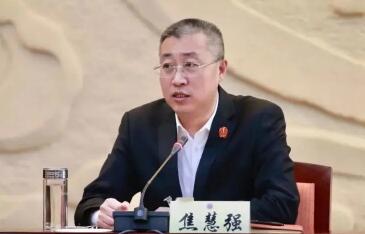Written article | Gao Yuyang
The latest news on May 8th of the Beijing Discipline Inspection Commission, Jiao Huiqiang, deputy prosecutor of the Beijing Municipal People's Procuratorate.
The last public appearance of Jiao Huiqiang was on April 24th. On the morning of the same day, the Beijing Municipal People's Procuratorate held a press conference of intellectual property procuratorial protection through the official Weibo graphic live broadcast of Beijing Procuratorate. Jiao Huiqiang attended the introduction of the press conference.
In addition, he has been working in the Beijing Municipal Law System for 25 years since he participated.
Former Dean of Tongzhou District and Haidian District Court
Jiao Huiqiang was born in June 1973 and joined the work in 1995. The first stop of the work was at the Civil Administration Department of the Beijing Procuratorate.
Beginning in July 2004, Jiao Huiqiang served in the First Branch of the Beijing Procuratorate. He has successively served as the director of the Civil Administration Procuratorate, a prosecutor, a member of the Prosecutor's Committee, the director of the Investigation and Supervision Division, assistant to the prosecutor, and a member of the Prosecutor's Committee.In the meantime, he was an assistant to the director of the letters and visits office of the Beijing Municipal Party Committee and Municipal Government.
In March 2013, Jiao Huiqiang served as a member of the party group and deputy prosecutor of the First Branch of the Beijing Procuratorate.

In October 2014, Jiao Huiqiang was transferred from the procuratorate to the court system and served as the lead. He became the vice president, dean, and dean of the Tongzhou District People's Court.
In May 2016, Jiao Hui emphasized to the People's Court of Haidian District, Beijing, as the vice president, dean, and dean.
In March 2019, Jiao Hui returned to the procuratorial system, and returned to the Beijing Procuratorate, who was originally participating in the work of his work, and served as the Deputy Procuratorate.
During his tenure at the First Branch of the Beijing Procuratorate, Jiao Huiqiang was studying from September 2007 to July 2010 at the Constitutional and Administrative Law of the School of Political Science and Law of the Capital Normal University. He obtained a master's degree in law.In addition, in 2014, Jiao Huiqiang, then deputy prosecutor of the Beijing Procuratorate, cooperated with others to publish several practical issues of civil procuratorial supervision in the People's Procuratorate.
The only post -70s in the leadership team of the Municipal Procuratorate
The last public appearance of Jiao Huiqiang was on April 24th. The Beijing Municipal People's Procuratorate held a press conference on the protection of intellectual property procuratorial protection. The theme was to give full play to the procuratorial function and serve the high -quality development of the capital.At the meeting, the city's procuratorial organs approved the arrest of 138 and 220 cases involving intellectual property crimes in accordance with the law in 2019, and 143 279 people prosecuted in accordance with the law.
Jiao Huiqiang attended the press conference and introduced the relevant situation. He said: In particular, he must strictly handle the criminal cases of intellectual property involved in the epidemic in accordance with the law, strengthen the business guidance and key case supervision of higher -level institutes, eat through legal and policies, ensure the quality of case handling, effectively guarantee effectivelyThe epidemic prevention and control work is smoothly advanced according to law.
The Guanhai Solidation Bureau noticed that the leadership team of the Beijing Municipal People's Procuratorate was in four, and there was another director of the Political Department, with a total of 6 people.The official website shows that Jiao Huiqiang ranks the last one among the 6 people.Moreover, he is the youngest of the 6 people and the only post -70s.
Call me at any time, happy to accompany
Jiao Huiqiang was the leader in the Haidian District Court, which is also an important stop in his career.
After transferring to the Haidian Court, he built West Garden and West Corridor in the court.In an interview, Jiao Huiqiang said that after discovering such a wasteland, it was a pity that he was abandoned and wanted to make good use of it.I watched twenty or thirty trips before and after I finally moved the idea of building West Garden. At that time, I considered three principles: one is to have greening, the other is to plant flowers and vegetables, and the third is to allow everyone to enter this place.When you come, you can sit down and take a break.
After the completion of West Garden, I felt a bit abrupt when I saw it north, and I always felt that something was missing.It is thought that through a certain form, it can not only be able to meet each other, but also build a platform for everyone to express and communicate.Eventually, the Western Corridor was built, using a traditional form of board. Everyone wrote a writing, drawing a picture, showing talents, venting ideas, and expressing the most authentic self.
The West Corridor has a call plate. Jiao Huiqiang said that there are any good ideas and ideas, looking for me on the shout at any time, and happy to accompany him!
During the President of the Haidian Court, Jiao Huiqiang did a summary of the work of the previous year at the beginning of the year and requested the work of the next year.In January 2018, he talked for three hours and was edited on the Internet with the theme of the Haidian Court on the theme of the Haidian Court.When he summarized the shortcomings of 2017, he summarized one by one with the three levels of the party group, middle -level cadres, and police officers.It is mentioned that there is not enough strength to communicate between the party group's team, the team and the middle level, and the lack of strength to grasp the key minority of the middle level.Police policemen are complicated, confused, and comprehensive literacy shortage.



